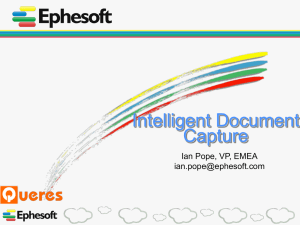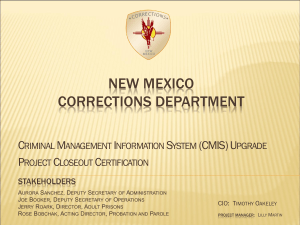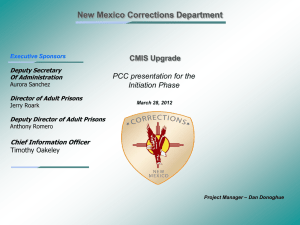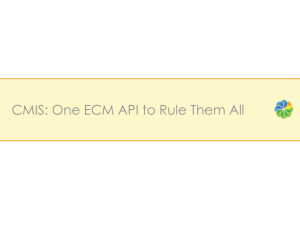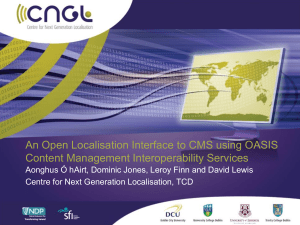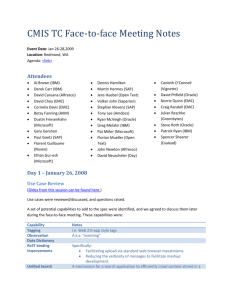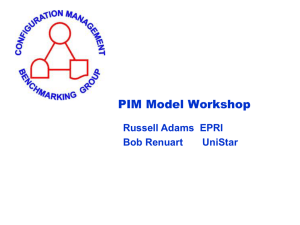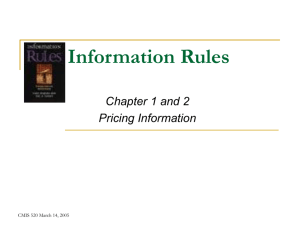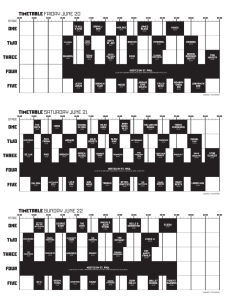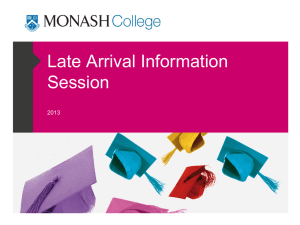FACILITY CMIS Presentation
advertisement
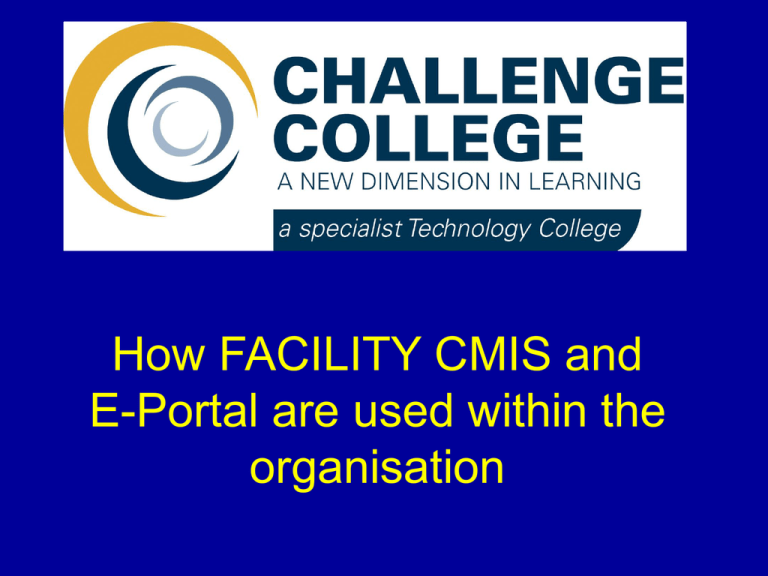
How FACILITY CMIS and E-Portal are used within the organisation Introduction CMIS - This is the school database where information about the school and how it operates is held. E-Portal - is a web based version of CMIS which allows teachers to view student records, complete registers and student reports. This presentation concentrates on how CMIS is used in school but does refer to E-portal. The Dark Ages – Life before CMIS Before CMIS life in a school was very different. Paper was used for everything, this was very time consuming and often needed many different people to carry out tasks. Here are just a few examples of how it worked: Student Files Huge amounts of filing had to be done regularly. Large central stores were used. Finding information about individuals was very difficult. Hand written records could be very hard to read and easily lost or filed badly. Registers These were paper base so checking an individuals attendance was very difficult. Statistics were all hand calculated and riddled with errors. Absence records all had to be checked manually. Mail Merges Student addresses are often exported out of CMIS so that letters to parents can be personalised, before CMIS this wasn’t available so letters were either not personalised or hand written. Timetables Staff, Student, Room and School Timetables were all hand written. So when there was a room change this caused huge amounts of paper work as each timetable had to be re-written. School Reports These were hand written, if there was a spelling mistake the whole report had to be re-done which caused lots of extra work for some staff. Photographs Photographs are taken when a student starts at school and stored in CMIS, they are used for many different reasons. Previously photos were taken and then had to be stored in the file. If you needed to identify a student you had go through each file to find the person you wanted. How does Challenge use CMIS? • • • • • • • Student Records School Timetable Assessment Information Examination Information Cover Attendance Complete Government Returns Here is a screen shot of Facility CMIS Here is a screen shot of E-portal Who Uses CMIS? • Teachers • Admin Staff In the future E-portal will be available for use by: • Parents • Governors Users are given very limited access rights these are issued on a “need to know bases”. This follow’s the Data Protection Act and protects student and staff from being able to access confidential information. How does the school use CMIS? Here are just 2 examples of how the school uses CMIS Student Records When a student enrols they are asked to complete a data check sheet. This information is entered into CMIS. Information is shared between schools and can be transferred if a student moves to another school. From the minute a student begins at Challenge we build on their file and record as much information as possible this includes: Personal details Name, date of birth and home address and telephone number etc) Contacts In an emergency the school must be able to contact a member of the family so their personal details are stored here. Siblings Any brothers or sisters who currently attend Attendance This is automatically transferred when a teacher completes the register. Assessment and Examination results Prior attainment is recorded as is all school reports and any external exam results. Statistics It is very easy for the school to produce a wide variety of statistics that can be used by students, parents, teachers, school governors and the government. This window is where we store student information The School Timetable Each year a new whole school timetable is implemented. This is a huge task and although it sounds simple and quick it actually takes many many hours of careful planning and preparation. CMIS is a fantastic help and is capable of writing and designing the timetable taking into account the many restrictions that the school has in place. Example: A teacher can only teach 1 group of students at a time this may seem obvious but if you consider that we have 60+ teachers and 30+ lessons being taught each period for 25 periods per week it is very easy for a teacher to be double booked. A less obvious restriction is that we only have 1 Drama Studio therefore we can only have 1 lesson of Drama taking place at any 1 time. Using the software we are able to write the school timetable, adjust it as necessary and then print timetables out for staff and students. Once the timetable is complete it is used in many different ways throughout the academic year. Main examples are: Finding a free classroom, finding a teacher, finding a student, finding a group of students. If a teacher is absent we are able to use it to find out which lessons they teach that day and cover their lesson with either a free teacher or a supply teacher. This shows what information is collated in CMIS to help design and write the school timetable. It is very complex so users must be thoroughly trained before they are allowed to use the timetable package – a badly written timetable can effect every member or staff and every student for a full year. Benefits of CMIS and E-portal for the school CMIS was specially designed to reduce paperwork by operating from a central data store. Data is entered once and is available immediately for all management functions, ensuring that the stored information is always up-to-date and accurate. Changes can be made through various associated programs so there are no delays or time lags. Whenever data is called up it is extracted from live figures and so produces an accurate picture of the school at the time it is needed. • One single system for all school information • Single entry, multiple use saves time and effort • Innovative functionality • Ease of use • Powerful, accurate data How does it help? • Reduces the time it takes to locate resources. Locate any resource any time • Manage room utilisation with maximum efficiency • Maximise and manage the use of space • Planning what could be done in the future • Information is stored in one central system • Clear and measurable cost benefits • Build quicker relationships with new students • Access to up-to-date timetable information in the format they want, whenever required • Record student attendance and assessment online Future Developments • Automatic SMS Text messages to Staff/Parents/Carers • More users with access to E-Portal (parents, governors, students etc) • A new finance package that links with the school database • Automatic Internet Data Transfer from one school to another • School Analysis – A programme that can analyse the school and how it is performing on a day to day basis Conclusion School life has changed dramatically since the implementation of CMIS. We now have huge amounts of information available at our finger tips. However, there are still a few areas of concern: Untrained users can do large amounts of damage to the system, all users have to be thoroughly trained before they are allowed to access the live database. This is time consuming but essential. There is a large amounts of information available to users so they must ensure they obtain the required information – ‘not being able to see the wood for the trees’. CMIS is very flexible and can be customised to meet the demands of the school but flexibility can be a problem if used by untrained staff.
